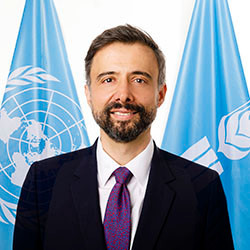UN Food Systems Summit + 2 Stocktaking
IFAD Asset Request Portlet
Publicador de contenidos
UN Food Systems Summit + 2 Stocktaking
Opening session Statement by Alvaro Lario, President of IFAD
Por Alvaro Lario
Lugar: Rome, Italy
24 julio 2023Check against delivery
Two years ago, we agreed at the Food Systems Summit that the need to transform our food systems was greater than ever – to curb hunger and poverty, improve our global health and mitigate the catastrophic impact of climate change.
Now we meet again to take stock of progress. And while many actions have been taken, we still have a long way to go.
The numbers are clear. It is imperative to speed up the financing for food systems transformation as a condition to achieving the Sustainable Development Goals (SDGs) and climate agreements:
The environmental damage caused by our existing food systems amounts to more than US$3 trillion annually.
The public health costs related to unhealthy diets, including obesity, are estimated at a staggering US$6 trillion. And the suffering due to undernourishment costs approximately US$1.8 trillion each year.
At the same time, while the world wastes around US$1 trillion worth of food annually, hunger affects between 690 and 783 million people.
Finally, the inequity within our food systems, especially affecting rural and indigenous peoples, ethnic minorities, women and youth, costs an estimated US$800 billion annually.
In other words – while the cost of financing the transformation of food systems is high, the cost of not financing it is much, much higher.
The question becomes: how much would it cost to get back on track and build a better future for the planet?
$400 billion USD are estimated to be needed in additional investment per year until 2030. That is what governments north and south, the private sector and development partners, need to mobilize to transform global food systems so they become sustainable, inclusive and resilient.
That may seem like a lot but it pales in comparison to the $10 trillion the global food industry is worth … or the $700 billion paid in agricultural subsidies in wealthy countries.
But clearly, financing food systems transformation is not only about more capital but also about what we finance, and what we need to stop financing.
Priority should be given to finance instruments and business models that work for primary producers and food-systems operators. It is mostly rural small producers who are the people behind our plates, who grow a large part of our food. However, as we know, they yet make up most of the poor and many times hungry as well. We must also advance progress and transitions from food systems that harm human health, and the planet.
The UN Secretary-General has called for a much-needed SDG stimulus of US$500 billion per year to massively increase financing for sustainable development. We must explore new international financing mechanisms that can provide development finance at scale – and for agriculture as much as for climate.
This entails a bold increase in domestic resource mobilization, scaling-up affordable long-term financing for development, substantial international development financing through targeted Official Development Assistance (ODA), transformative private investment through blended finance, and new international financing mechanisms.
IFAD and the World Bank are leading the financing arm of the Foods Systems Transformation and have taken action to keep track of the financial flows towards agricultural development and ensure impactful decisions.
In partnership with the OECD we developed the prototype of Financial Flows to Food Systems (3FS), which offers decision-makers real-time information and an evidence base to draw high-level political attention to financial gaps and steer transformative investments into food systems.
We are also working to mobilise and scale up private sector investment. I am encouraged by the progress shown by influential global, national and local companies in their awareness of environmental, social, and governance issues.
Finally, we must also advocate for immediate and game-changing levels of liquidity for food systems transformation, the capitalization of Public Development Banks, domestic and regional, to support sustainable investments.
My hope is that we will leave here with greater determination and global solidarity to make food systems transformation a reality and secure a healthier, sustainable future for generations to come.
Thank you.
